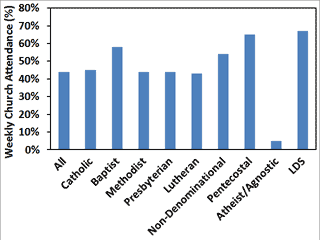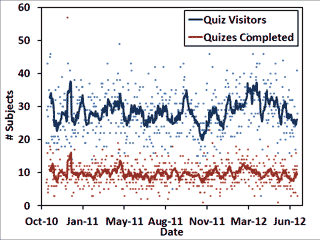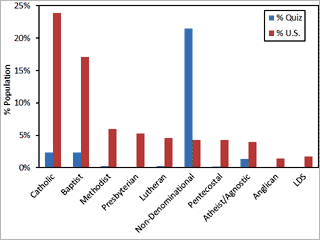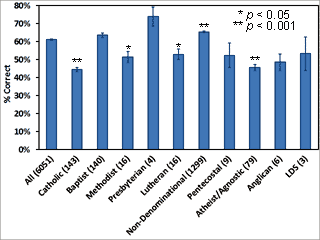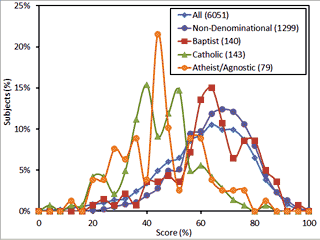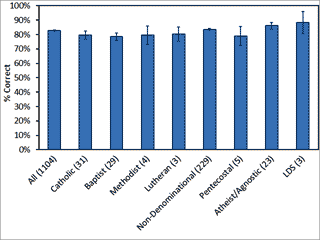Christians from Which Denomination Have the Most Thorough Knowledge of the Bible?

Abstract
An online Basic Christian Theology Quiz was used to assess whether there are differences in Bible literacy among parishioners of various Christian denominations. The results showed that non-denominational and Baptist believers exhibited significantly higher Bible knowledge than Roman Catholics, Lutherans, and Methodists.
Introduction
Ninety-three percent of U.S. Americans have a Bible in their home.1 So, we would expect most Americans to be familiar with basic Christian biblical principles, right? However, according to a Gallup poll, only 59% of Americans read the Bible even "occasionally."2 Only 21% read the Bible weekly.2 So, it would not be surprising if the average American had a poor understanding of basic biblical principles. However, many Christians get their Bible teaching through their local church. Denominational churches that teach more from the Bible are more likely to have Bible-educated followers. A Gallup survey showed large differences in church attendance among denominations, with Baptist, non-denominational, Pentecostal and LDS churches securing more attendees.3 Since individual Bible study is sporadic, it seems that those denominations that regularly teach from the Bible and have larger attendance would have parishioners who were more Bible literate. This hypothesis has been tested through an online "Basic Christian Theology Quiz."
Materials and Methods
Software
The "Basic Christian Theology Quiz" has been online since January, 2001. In October, 2010 the quiz was changed from a JavaScript format to the Perl/CGI QuizTest script (Scripts for Educators, www.tesol.net/scripts/), which allowed recording of quiz results. Besides individual results, the software was setup to record the participant's religion and denomination. The Bible quiz consisted of 25 5-possible-answer multiple choice questions related to basic biblical theology (see appendix). For this study, results were accumulated for the time period October 8, 2010 through June 27, 2012.
Participant Recruitment
Participants were recruited online through the website Evidence for God from Science (www.GodAndScience.org), a Christian apologetics website. Participant recruitment was accomplished through links scattered mostly throughout the "theology" pages of the website, along with some search engine traffic:
| Referral Page | Number of Referrals |
|---|---|
| Internal Links | 12,135 |
| Christian Theology and Doctrine | 6,893 |
| Why Does This Site Quote So Many Bible Verses? | 1,361 |
| Atheism Test Question 1 | 1,156 |
| Who Is Satan? | 619 |
| Evidence for God from Science Quizzes | 282 |
| Basic Christian Theology Quiz | 170 |
| What Will Heaven be Like? | 148 |
| Have Christians Already Overcome Satan? | 150 |
| Discovery Bible Study Manual | 75 |
| Eternal Security of the Believer | 73 |
| Other | 1,226 |
| External Links | 2,703 |
| 1938 | |
| Yahoo | 151 |
| Bing | 135 |
| Others | 479 |
| TOTAL | 14,838 |
An average of 9.8 participants per day completed the quiz for a total of 6,051 participants out of 14,838 referrals. The number of Quiz visitors and completed quizzes over the duration of the study are shown in Figure 1.
Site Statistical Analysis
Analysis of site statistics was done using
Deep Log Analyzer
(www.deep-software.com).
Results
Demographics
Figure 2 shows the religious demographics of Bible quiz participants. The data shows that the vast majority of quiz takers came from non-denominational churches. In contrast, the majority of the U.S. population attends either Roman Catholic or some form of Baptist church.4 So, all denominations are under-represented in recruited Bible quiz participants.
Although Evidence for God from Science is an international ministry, most quiz participants were recruited from the United States:
| Country | # Visitors | |
|---|---|---|
| United States | 9,537 | (72%) |
| United Kingdom (Great Britain) | 684 | (5%) |
| Canada | 564 | (4%) |
| Philippines | 339 | (3%) |
| Australia | 300 | (2%) |
| India | 251 | (2%) |
| South Africa | 133 | (1%) |
| China | 100 | (1%) |
| New Zealand | 92 | (1%) |
| Germany | 74 | (1%) |
| Others (132 other countries) | 1,209 | (9%) |
Scoring
Figure 3 shows the scoring percentage based upon denomination/religious preference. Since the quiz was designed to be difficult, scoring was spread across a wide range (0-100%), with the average being 61%. As expected, there were significant differences in Bible knowledge across denominations and religious belief. Christian denominations that tend not to emphasize biblical teaching, such as Roman Catholics (45%), Lutherans (53%), and Methodists (52%), scored below the statistical average. Those denominations that do place an emphasis on Bible teaching, such as Baptists (64%, although did not reach statistical significance) and non-denominational churches (65%), scored higher than average. A significant number of atheists and agnostic participants (79) took the Bible quiz. Since, for the most part, members of these groups do not study the Bible, they scored significantly below average (at 46%)—only slightly above Roman Catholics (at 45%).
The distributions of test scores are shown in Figure 4. All distributions are approximately normally distributed.
Discussion
The hypothesis that certain Christian denominations have better understanding of basic Christian Bible knowledge is confirmed by results of an online Bible quiz. Because of large sample sizes involved in the study, it is unlikely that the result is due to sampling bias. Individuals belonging to Roman Catholic, Lutheran, and Methodist denominations scored significantly lower than the general population. Christians attending non-denominational churches scored significantly higher than average. For the most part, scoring on the quiz was indirectly proportional to the relative church attendance percentages found in the 2006 Gallup survey of church attendance.
Is it possible that the selection method has somehow skewed the demographics such that certain groups have excess numbers of Bible-proficient/nonproficient individuals? The website, Evidence for God from Science tends to attract individuals who are interested in Christian apologetics, making it more likely that those individuals would be more serious about their Bible knowledge. This probably explains why non-denominational believers are highly over-represented among Bible quiz participants. In order to test whether individuals from certain denominations have general deficits or proficiency in knowledge, a more generalized religious knowledge quiz, modeled after the Pew Forum U.S. Religious Knowledge Survey,5 was instituted. The results from this study showed that no particular denomination scored above or below the mean result (Figure 5, p > 0.05). Not only were the results equal across denominations, participants of the Pew Forum quiz scored much higher than those who participated in the Pew Forum U.S. Religious Knowledge Survey (83% correct answers compared to 50% correct answers). Therefore, differences in biblical knowledge among participants of various denominations are probably not due to a deficit in general religious knowledge, but more likely due to a specific defect in knowledge of the Bible.
Conclusion 
Knowledge of basic biblical principles has been shown to vary across Christian denominations, with non-denominational and Baptist believers exhibiting significantly higher Bible knowledge than Roman Catholics, Lutherans, and Methodists.
PDF Version
![]() (730 KB)
(730 KB)
Related Pages 
- Basic Christian Theology Quiz
- Pew Forum Religious Knowledge Quiz
- Discovery Bible Study Manual
- Christian Theology and Doctrine
References 
- Cindy Wooden. 2008. Not an easy read: Survey indicates Bible hard to understand. Catholic News Service.
- Alec Gallup and Wendy W. Simmons. 2000. Six in Ten Americans Read Bible at Least Occasionally. Gallup, Inc.
- Frank Newport. 2006. Mormons, Evangelical Protestants, Baptists Top Church Attendance List. Gallup, Inc.
- U.S. Religious Landscape Survey, Pew Forum, February, 2008.
- U.S. Religious Knowledge Survey, Pew Forum, September, 2010.
Appendix
Basic Christian Theology Quiz
B. Part of the Bible is wise instruction from men, and part is from God.
C. The entire Bible is inspired.
D. A and B.
E. All of the above.
B. The four Gospels are Psalms, Proverbs, Isaiah, and Daniel.
C. The New Testament has no relation to the Old Testament.
D. Many books in the New Testament were letters to different Churches and groups.
E. All of the above.
B. Jeremiah.
C. Psalms.
D. Job.
E. All of the above.
B. There is no need to study the Bible because God can teach us through our experiences.
C. The most important thing we can achieve from our study of the Bible is the large amount of facts that come in handy in debates.
D. Memorizing God's Word enables us to use the sword of the Spirit to overcome Satan.
E. A and B.
B. God uses pastors to teach us truths they have found in Scripture.
C. It is important to establish regular habits and times for your study of the Bible.
D. Reading the Bible gives us an overall picture of God's Word.
E. All of the above.
B. Messiah.
C. God.
D. An angel.
E. All of the above.
B. Was hungry.
C. Lied.
D. A and B.
E. All of the above.
B. Following conception, Jesus Christ was born, grew and developed as all other men.
C. Others who knew Jesus Christ believed that He was God.
D. Jesus Christ was half God and half man.
E. B and D.
B. Jesus claimed to be the only way to God.
C. Jesus created the universe.
D. Jesus died.
E. All of the above.
B. Is fully God.
C. Visited Sarah, the wife of Abraham in the Old Testament.
D. A and B.
E. All of the above.
B. Men can reach God without having to come to Jesus Christ.
C. Jesus Christ's death took place in history and has no effect for us today.
D. God offers the gift of eternal life to all men.
E. None of the above.
B. When Jesus Christ died on the cross, God saw His death as the payment for the sins of all people.
C. Faith is simply believing intellectually that Jesus Christ is God.
D. One need not repent of his sins to make a commitment of his life to Jesus Christ.
E. A and B.
B. God loves all people and wishes they all could be saved.
C. One can acknowledge Jesus as Lord and Savior apart from the Holy Spiritís working his heart.
D. A and B.
E. All of the above.
B. It is the work of the Spirit to convict the world of sin.
C. The Scriptures teach that the Holy Spirit had a part in the creation of the world.
D. A and B.
E. All of the above.
B. The believer is filled with the Spirit by yielding himself wholly to God.
C. Believers are first filled with the Holy Spirit when they are baptized.
D. The Holy Spirit has a body, since He is part of the Body of Christ.
E. All of the above.
B. Grieving the Spirit will cause the believer to lose the sense of the Holy Spiritís blessing.
C. The Holy Spirit indwells the believer.
D. A and C.
E. All of the above.
B. God changed His goals He had for mankind after they rejected His Son and crucified Him.
C. Every person of the Godhead has every divine attribute common to the others.
D. The Holy Spirit is less powerful than Christ, just as Christ is less powerful than God the Father.
E. None of the above.
B. Satan is equal to Jesus.
C. God does not always know what we are thinking or what we might do next.
D. The universe and everything in it could exist without God.
E. None of the above.
B. The only effective prayer is given when a person is alone on his knees.
C. Prayer is communicating with God.
D. We pray in Christ's name because the words trigger God's reply.
E. C and D.
B. God will not answer the prayers of the one who harbors unconfessed sin.
C. God is glorified when we pray according to His will.
D. God does not always give everything one asks for.
E. All of the above.
B. Sin is breaking a set of rules established by man.
C. We confess our sins so that God will forgive us.
D. Repentance is feeling sorry about your sin.
E. None of the above.
B. Though the believer may feel unclean, he has been cleansed, purified and washed clean of sin.
C. We can be assured of eternal life if we continue to behave righteously.
D. There is a limit on Godís forgiveness of our sins (e.g., mortal sins).
E. All of the above.
B. Redemption refers to the price Jesus Christ paid for our sins.
C. The unbeliever is enslaved to Satan.
D. God justifies us on the basis of our best efforts to live the Christian life.
E. A, B, and C.
B. All Christians have the same ability to resist temptation.
C. Our heart is described as being purely motivated and righteous.
D. Our desires are a major source of temptation.
E. All desires are evil.
B. Fellowship with a local group of believers is optional.
C. Formal ministry is more important than informal ministry.
D. Ministry is receiving.
E. None of the above.
Reflections
We are what we think.
- 11/06/2012 12:17 AM
Can a Compulsive Thinker Also Be a Believer?
Some say that in order to have faith, one must ‚Äúcheck his brain at the door.‚ÄĚ Yet as a compulsive thinker (such that no twelve-step program would be able to cure me), I challenge this notion. In a recent talk … Continue reading
() - 11/01/2012 08:00 AM
Quote of the Week: Peter Toon
Apparently most people who attend church services today have never heard a sermon expounding the doctrine of the Blessed, Holy, and Undivided Trinity‚ÄĒthe transcendent, living God, Yahweh-Elohim, worshiped by Christians through the centuries. Further, they have had either little or … Continue reading
() - 10/30/2012 12:18 AM
Halloween and Other Hot Topics
Halloween. The September 11 attacks. Global warming. Hot topics can present a troubling challenge, even in a culture that values freedom of speech. Do we ignore touchy issues and avoid all confrontation, or do we engage in verbal warfare with … Continue reading
() - 10/25/2012 08:00 AM
Quote of the Week: Douglas Groothuis
Any truth claim negates every proposition that denies it. This is the logic of antithesis‚Ķ For instance, if Jesus is God incarnate, then he is not (1) a mere prophet of Allah (Islam), (2) a misguided reformer (Judaism), (3) an … Continue reading
() - 10/23/2012 01:49 PM
Reviews of 7 Truths That Changed the World on Hard-Core Christianity Blog
This week on Reflections I offer up a review of my new book by Christian apologist Melissa Travis, creator of the blog Hard-Core Christianity: ‚ÄúBook Review: 7 Truths That Changed the¬†World‚ÄĚ Melissa was a student of mine a few years … Continue reading
() - 10/18/2012 08:00 AM
Quote of the Week: Ed. L. Miller
The philosopher attempts to organize and systemize his or her encounters with existence and value, to articulate a Weltanschauung or ‚Äėworld view,‚Äô a general impression and judgment about the whole of things. ‚ÄďEd. L. Miller, God and Reason (Upper Saddle … Continue reading
() - 10/16/2012 01:43 PM
Straight Thinking Highlight: D’Souza’s Film on Obama
Does everyone have a worldview? What critical factors shape a person‚Äôs worldview compass? How important is it to correctly discern the worldview held by major influencers, such as our political leaders? With the Presidential campaign well under way, I thought … Continue reading
() - 10/11/2012 08:00 AM
Quote of the Week: Tony Lane
We need to read about the past in order to understand the present. People without a grasp of history are like a person without a memory. Many of the current beliefs in our society are properly grasped only when we … Continue reading
() - 10/09/2012 12:28 AM
Five-Point Logic Checklist
One of the most important skills to master, particularly if you intend to share your faith with others, is how to form a logical argument. Though it might seem complicated, an argument in logic is really a very simple thing. … Continue reading
() - 10/04/2012 08:00 AM
Quote of the Week: Westminister Shorter Catechism
Q: What is the chief end of man? ¬†A: Man‚Äôs chief end is to glorify God, and to enjoy him forever. ‚ÄďWestminster Shorter Catechism, Question 1
()
http://www.godandscience.org/doctrine/bible_knowledge_denominations.html
Last Modified July 5, 2012
